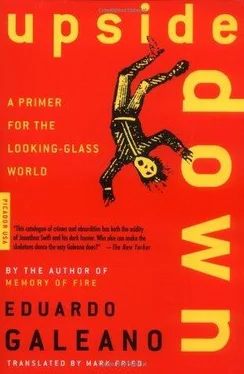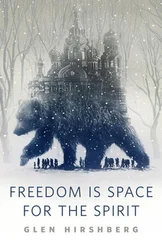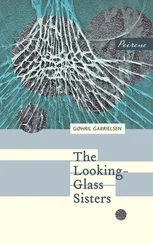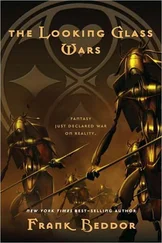Among the ghosts of international terrorism, “narco-terrorism” is the one that’s most frightening. To say “drugs” is like saying “the plague” in another epoch: it evokes the same terror, the same sense of impotence, of a mysterious curse from the Devil incarnate, who tempts his victims and carries them off. Like all misfortune, it comes from outside. Not much is said anymore about marijuana, once the “killer weed,” and perhaps that has something to do with the way it has become a successful part of local agriculture in eleven states of the Union. In contrast, heroin and cocaine, produced in foreign countries, have been elevated to the category of enemies that erode the very foundations of the nation.
Official sources estimate that U.S. citizens spend $110 billion a year on drugs, the equivalent of one-tenth the value of the country’s entire industrial production. Authorities have never caught a single U.S. trafficker of any real importance, but the war against drugs has certainly increased the number of consumers. As happened with alcohol during Prohibition, outlawing only stimulates demand and boosts profits. According to Joe McNamara, former chief of the San Jose police force in California, profits can be as high as 17,000 percent.
Desire
A man found Aladdin’s lamp lying around. Since he was a big reader, the man recognized it and rubbed it right away. The genie appeared, bowed deeply, and said: “At your service, master. Your wish is my command. But there will be only one wish.”
Since he was a good boy, the man said, “I wish for my dead mother to be brought back.”
The genie made a face. “I’m sorry, master, but that wish is impossible. Make another.”
Since he was a nice guy, the man said, “I wish the world would stop spending money to kill people.”
The genie swallowed. “Uhh … What did you say your mother’s name was?”
Drugs are as “American” as apple pie — a U.S. tragedy, a U.S. business, but they’re the fault of Colombia, Bolivia, Peru, Mexico, and other ingrate nations. In a scene straight out of the Vietnam War, helicopters and planes bomb guilty-looking Latin American fields with poisons made by Dow Chemical, Chevron, Monsanto, and other chemical companies. Devastating to the earth and to human health, the sprayings are next to useless because the drug plantations simply relocate. The peasants who cultivate coca or poppies, the moving targets in these military campaigns, are the smallest fish in the drug ocean. The cost of the raw materials has little effect on the final price. From the fields where coca is harvested to the streets of New York where cocaine is sold, the price multiplies one hundred to five hundred times, depending on the ups and downs of the underground market for white powder.
Is there a better ally than drug trafficking for banks, weapons manufacturers, or the military hierarchy? Drugs make fortunes for the bankers and offer useful pretexts for the machinery of war. An illegal industry of death thus serves the legal industry of death: vocabulary and reality become militarized. According to a spokesman for the military dictatorship that razed Brazil from 1964 on, drugs and free love were “tactics of revolutionary war” against Christian civilization. In 1985, the U.S. delegate to a conference on narcotic and psychotropic drugs in Santiago, Chile, announced that the fight against drugs had become “a world war.” In 1990, Los Angeles police chief Daryl Gates suggested that drug users be riddled with bullets “because we are at war.” Shortly before that, President George Bush had exhorted the nation to “win the war” against drugs, explaining that it was “an international war” because the drugs came from overseas and constituted the gravest threat to the nation. This war is the one subject never absent from presidential speeches, whether it’s the president of a neighborhood club inaugurating a swimming pool or the president of the United States, who never misses a chance to exercise his right to grant or deny other countries certification for their good conduct in it.
A problem of public health has been turned into a problem of public security that respects no borders. It’s the Pentagon’s duty to intervene on any battlefield where the war against “narco-subversion” and “narco-terrorism” (two new words that put rebellion and crime in the same bag) is being waged. After all, the National Anti-Drug Strategy is directed not by a doctor but by a military officer.

Frank Hall, former head of the New York police narcotics squad, once said, “If imported cocaine were to disappear, in two months it would be replaced by synthetic drugs.” Commonsensical as that might seem, the fight against the Latin American sources of evil continues because it offers the best cover for maintaining military and, to a large degree, political control over the region. The Pentagon wants to set up a Multilateral Anti-Drug Center in Panama to run the drug war waged by the armies of the Americas. For the entire twentieth century, Panama was a major U.S. military base. The treaty that imposed that humiliation on the country expired on the final day of the century, but the drug war could well require that the country be rented out for another eternity.
For some time now drugs have been the major justification for military intervention in the countries south of the Rio Grande. Panama was the first to fall victim. In 1989, twenty-six thousand soldiers burst into Panama, guns blazing, and imposed as president the unpresentable Guillermo Endara, who proceeded to step up drug trafficking under the pretext of fighting it. In the name of the war on drugs, the Pentagon is making itself at home in Colombia, Peru, and Bolivia. This sacred crusade — Get thee hence, Satan! — also gives Latin America’s armies another reason for existing, hastens their return to the public stage, and provides them with the resources they need to deal with frequent explosions of social protest.
General Jesús Gutiérrez Rebollo, who headed up the war on drugs in Mexico, no longer sleeps at home. Since February 1997, he’s been in jail for trafficking cocaine. But the helicopters and sophisticated weaponry the United States sent him to fight drugs with have proved quite useful against upstart peasants in Chiapas and elsewhere. A large portion of U.S. antidrug aid to Colombia is used to kill peasants in areas that have nothing to do with drugs. The armed forces that most systematically violate human rights, like Colombia’s, are those that receive the most U.S. aid in weapons and technical assistance. For years, they have been making war on the poor, enemies of the established order, while defending the established order, enemy of the poor.
After all, that’s what it’s about: the war on drugs is a cover for social war. Just like the poor who steal, drug addicts, especially poor ones, are demonized in order to absolve the society that produces them. Against whom is the law enforced? In Argentina, a quarter of the people behind bars who have not been sentenced are there for possession of less than five grams of marijuana or cocaine. In the United States, the antidrug crusade is focused on crack, that devastating poor cousin of cocaine consumed by blacks, Latins, and other prison fodder. U.S. Public Health Service statistics show that eight out of ten drug users are white, but of those in jail for drugs only one in ten is white. Several uprisings in federal prisons labeled “racial riots” by the media have been protests against unjust sentencing policies. Crack addicts are punished a hundred times more severely than cocaine users. Literally one hundred times: according to federal law, a gram of crack is equivalent to one hundred grams of cocaine. Practically everyone imprisoned for crack is black.
Читать дальше












